Anime Dubs as Good as Cowboy Bebop
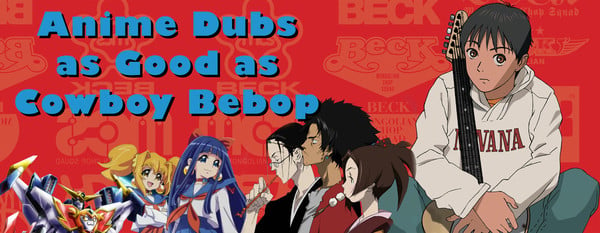
Cowboy Bebop may be the gold standard of English dubs, but it's hardly alone. While some fans prefer subs over dubs, there are plenty of shows that make the case for watching in English. Our editorial staff shares some of their favorites.
Promare
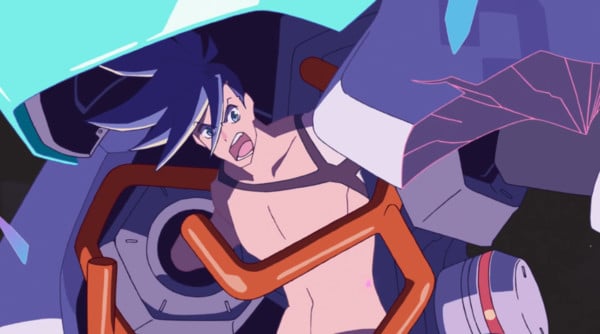
While Trigger cast many of their movie Promare's primary roles with screen actors rather than voice actors, NYAV Post took the opposite approach for the English dub: stack the cast with anime dub veterans, most of them with multiple decades of experience under their belt. The result is nothing short of spectacular, as every performance brings through director Hiroyuki Imaishi's famously bombastic emotions without turning hammy or one-dimensional. The maximalist visuals and musical score could easily have overwhelmed the characters' arcs, turning them into a mere vehicle for spectacle. Still, like the characters themselves, the dub cast refuses to be pushed aside.
Many of the cast rarely do anime anymore. Crispin Freeman mostly does video games, so hearing him chew the scenery as the antagonist Cray Foresight was a delight. Kari Wahlgren, who now has awards for her performances in domestic children's animation, hadn't been in a dub that wasn't reprising an older role in years, but she's the only choice for matching Mayumi Shintani's distinctive nasally tones, first as FLCL's Haruko Haruhara and then as Promare's Lucia Fex. Steve Blum quite literally has the world record for most prolific video game actor, which says everything about where his priorities lie – justifiably so, considering the pay difference and anti-union conditions most anime dubs are produced under.
Johnny Yong Bosch, on the other hand, still does anime regularly, but performs against type as the film's deuteragonist, Lio Fotia. Lio is the young leader of the Mad Burnish, a guerrilla organization fighting for the liberation of the Burnish, an oppressed minority with the power to control flames. Bosch plays Lio with the quiet intensity necessary to sell the character and his relationship with Galo, making it all the more powerful when his rage and sadness explode from him.
The only voice actor without a decade-plus of experience was Billy Kametz, the voice of the protagonist Galo Thymos. Kametz had already marked himself as someone worth paying attention to as Josuke Higashikata in JoJo's Bizarre Adventure: Diamond Is Unbreakable and Ferdinand von Aegir in Fire Emblem: Three Houses; Promare cemented his place as a rising star in the dub world. Galo is a consummate himbo, the kind who yells 75% of his dialogue, yet Kametz was able to bring out his sweetness and emotional intelligence on top of his general boneheadedness. That complexity made it possible for the movie's maximalist climax to work from a character perspective as well as a story and action perspective. Tragically, Kametz passed away in 2022 from colorectal cancer at just 37 years old, cutting his promising career short. Even if he was only active for a few years, he will long be remembered for his extraordinary performances, including in Promare.
—Caitlin Moore
Pop Team Epic
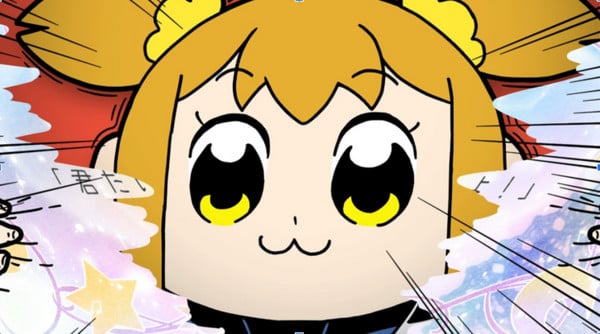
At the risk of asking a question that's already answered by other entries in this piece, what makes an anime dub good? Is it a considered localized script that makes a work more approachable to people who live outside of the culture that influenced the work? Is it inspired vocal direction that manages to elevate the original work? Or is it a nuanced performance that gets to the heart of the characters and themes of the larger series?
Pop Team Epic's English dub doesn't have any of the qualities that make Cowboy Bebop or other celebrated dubs so great. What it does have is a tone and format that allows Crunchyroll's extensive rolodex of vocal talent to go insane for about 11 minutes at a time! In what other anime will you hear Sean Schemmel and Michael Sinterniklaas fail at hosting a cooking show or witness Colleen Clickenbeard talk down Justin Briner in falsetto from committing murder? If Johnny Yong Bosch playing off Robert McCollum in a send up of yakuza movies or Brittney Karbowski doing a parody of Hikaru no Go with Luci Christian doesn't make Pop Team Epic an all time great English dub, then I don't feel confident saying any anime has a better dub than Bebop!
The Pop Team Epic dub has more than just its audacity and star power going for it as well. Very little oversight or direction was given to the Japanese VAs during the recording, leaving them free to get as weird as they want with any given line read. While any actor worth their salt can “go big” on a take, I can't even imagine how difficult it is to mimic the intensity, weirdness, and timing of another actor who was given near-complete freedom in their performance. It's a contradiction to intentionally channel the irreverence of the original performances that make Pop Team Epic such a fun show, but the English VAs do a phenomenal job of meeting that challenge.
Case and point, Ian Sinclaire and Christopher Sabat as the Bob Epic Team voices are some of the best work either has done in their, much-acclaimed, careers. These segments are so intentionally off-putting and hilarious that they're almost impossible to describe, and the duo manages to perfectly capture the deep-fried internet meme energy that makes these scenes work so well. Ian Sinclaire's vocal stylings in the Hellshake Yano sequence in episode 7 are also one of the best English dub performances of all time, and a big part of why I'm never gonna stop thinking about Hellshake Yano.
—Lucas DeRuyter
Pluto
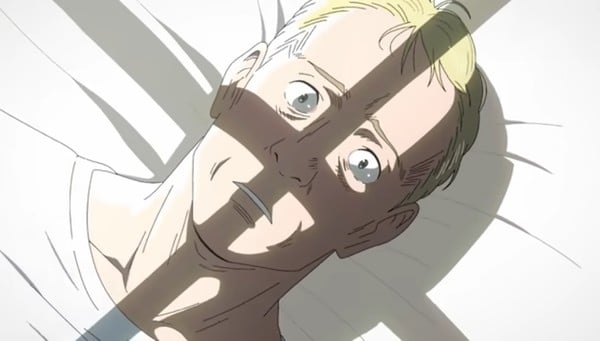
There are a lot of reasons to watch Naoki Urasawa's retelling of the “Greatest Robot on Earth” story arc of Osamu Tezuka's Astro Boy (not least of which being that it's some top class science fiction, and said Astro Boy storyline is one of the most influential manga ever made), but on top of everything else this show does well, one of its most attractive features is its English dub. The dub's voice director, Patrick Seitz had previously worked on the dub for another one of Naoki Urasawa's works, Monster (which is sadly a dub that seems to have been trapped in a web of legal tape), and alongside the dub's co-director, Kirsten Perotti, managed to put together one of the most impressive dubs to come out within those two years. Despite this being his first anime role, Jason Vande Brake manages to deliver a masterful performance as the protagonist, Gesicht, and does a great job of balancing his over-professionalism as a robot detective with a strong sense of humanity, and captures the warmth and buried rage that this humanity embodies. Laura Stahl, is equally strong as the show's co-lead Atom, and brings her experience playing young boys across other anime dubs as such as Hayato in JoJo's Bizarre Adventure: Diamond Is Unbreakable, and Ray in The Promised Neverland, to make the character sound believably childish, while still nailing all of the show's dramatic beats as Atom navigates his way through the tragedies at the core of the its central mystery. They're joined by one of the strongest ensembles of actors I've ever heard, including anime dubbing veterans such as Keith Silverstein as the gentle pacifist Epsilon (which is pretty ironic given that he also played the titular monster, Johan Libert in Monster), Sung-Won-Cho as the mysterious and unsettling robot turned killer, Brau-1589, and even Patrick Seitz himself turning in a heart tugging performance as the traumatized war vet, North No. 2.
The cast also includes quite a few big-name actors who largely operate outside the anime space, such as Nolan North as the anti-robot bigot Adolf Hass, and most notably, Keith David as the mysterious and enigmatic Dr. Tenma. While Keith David's performance is certainly a big highlight, nearly everyone else in the dub can keep pace with him, and given how much of an acting legend Keith David is both in and outside of animation voice over, this feat speaks well to both the cast and Patrick and Kirsten's direction on the dub. For as good as these veterans were though, I was even more impressed by Kamran Nikhad as Professor Abullah, whose take on the role does a great job of selling the tragedy of a man who has lost everything except his hate at those who wronged him, and given many of the story's parallels to the actions of the Bush Administration during the Iraq War, I'm glad that the team went out of their way to cast a Middle-Eastern American actor for the character; his work helps to enhance the material. All of these great performances are piled on top of an equally strong localization, as Patrick Seitz's adaptive script does a good job of filling the dub with a lot of prose that matches the philosophical nature of Urasawa's material, while still getting across its message about the futility of hate, and why that remains as important as ever. This is a top-class dub from top to bottom, and easily deserves to be remembered as one of the all-time greats. If you ended up passing on this dub when the show first came out, or just haven't seen Pluto in general, I can't stress enough how much this is worth checking out, and with how much the cast is firing on all cylinders, I'm confident you'll find at least one performance that sticks with you.
—Jairus Taylor
Robotech
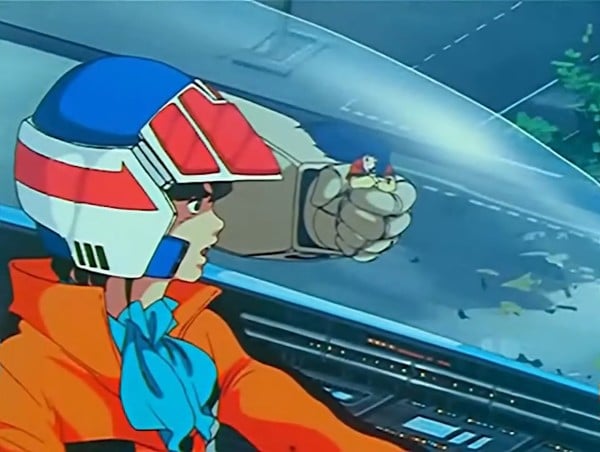
“In the year 1999, high above Macross Island in the South Pacific, a phenomenal event occurred in the skies which altered the course of human history.” This is the opening line of Robotech, delivered in the dulcet tones of J. Jay Smith and has been firmly planted in my mind since 1998 when I first saw the show on Toonami.
Despite being a dub from the mid-80s, the cast of Robotech brings a lot of gravitas to the space opera. Some of them are veteran voice actors with dozens of titles under their belts. Tony Oliver, the English dub voice of Lancer in Fate/stay night and Arsène Lupin III in Lupin the Third, voices the first arc's main character, Rick Hunter. Meanwhile, Cam Clark, who's played roles ranging from Leonardo in the Teenage Mutant Ninja Turtles to Liquid Snake in Metal Gear Solid, picks up two major supporting roles in the series, Max Sterling and Lance Belmont.
Interestingly, he's far from the only voice actor to do multiple major roles in the series. Since the story takes place across three generations with no on-screen character crossover between them, there is a fair amount of repetition in the voice cast. This gives many of the actors a chance to show their chops in different roles. Gregory Snegoff, for one, plays everything from an enemy general (Khyron) to a strict scientist (Dr. Lang) to the heroic protagonist of the third arc of the story (Scott Bernard).
There are also more than a few members of the cast who don't have much of a voice acting career outside of Robotech but give amazing performances nonetheless. J. Jay Smith brings continuity to the multi-generational tale as the narrator for the show, and Greg Finley perfectly plays the part of Henry Gloval—the Russian captain/warm-yet-strict father figure to the characters of the first arc.
But perhaps the most notable performance comes from Rebecca Forstadt. With credits ranging from Code Geass (Nunnally) to Dangaronpa 2 (Monomi), she takes on the iconic role of Lynn Minmei—and gives the legendary idol just the right amount of innocence and vulnerability mixed with self-centeredness. But even more amazing, she sings the majority of Minmei's songs.
These are a high point in the show. Instead of translating and dubbing the songs from the original Super Dimension Fortress Macross, Super Dimension Cavalry Southern Cross, and Genesis Climber Mospeada, Robotech has a collection of its own, original music written to fit the show. In the third arc, the songs of cross-dressing idol/freedom fighter Yellow Dancer are sung and composed by Michael Bradley, a platinum record award-winning songwriter. Check out “Look Up (the Sky is Falling)” for an example of the show's original music—it's 80s-tastic and one hell of an earworm.
All in all, Robotech is my pick for the best dub of the 80s. While the dialogue can be stilted or melodramatic, these are more artifacts of the time than anything else. The voice cast makes this one a classic, especially once the original songs are brought into the mix.
—Richard Eisenbeis
KonoSuba – God’s blessing on this wonderful world!!
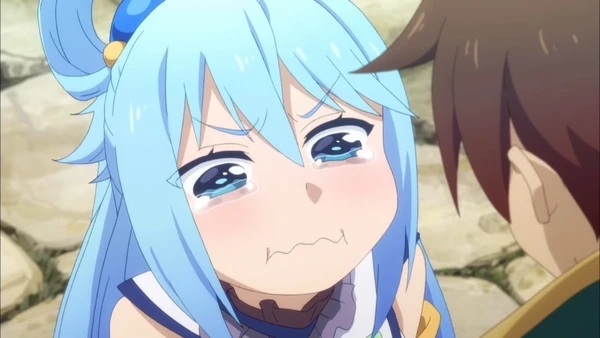
KonoSuba – God’s blessing on this wonderful world!! is often likened to an anime equivalent to It's Always Sunny in Philadelphia, and the comparison is apt. You've got an isekai where your protagonist is a raving jerk; he's saddled up with a water goddess that can't do squat; the party mage is the poster girl for all chuuni characters ever; and the party tank is a masochist.
KONOSUBA's comedy depends on these characters and their interactions; it's not enough to find someone who can sound vaguely aggressive, you need people who can hit that tone of raw patheticness to sell it. By God, they found them. They found them.
The English cast of KONOSUBA live their characters. When the script calls for Aqua to whimper like a sad puppy, Faye Mata digs deep and delivers with the kind of work that would make Sarah McLachlan grab the tissues. Arnie Pantoja's Kazuma isn't just a great pick because he can shout, he's a great pick because he channels the perfect amount of dripping contempt when he delivers one of Kazuma's trademark under-his-breath mutterings. Christina Valenzuela was called in to voice the masochist to end all masochists as Darkness. The results are not to be watched with small children in the room.
The quality of the performances cannot be chalked up entirely to the basic writing in KONOSUBA, especially with how well even the secondary and tertiary cast can hit the necessary marks. This is a solid cast delivering solid performances all the way through. My sides split every time I hear Faye Mata's performance as Aqua has yet another tragic encounter with a giant frog.
—Jean-Karlo Lemus
ERASED
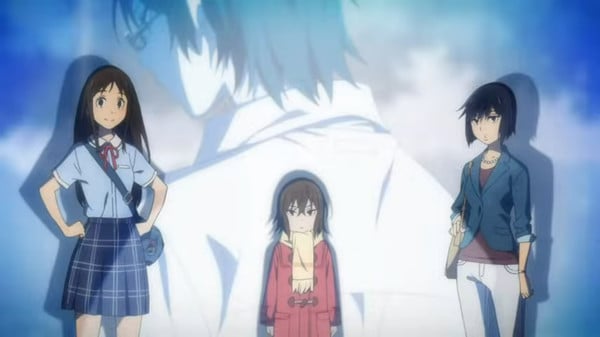
I often find myself preferring dubs for comedies; even if they aren't necessarily good dubs, there's something about the English casts of both Those Who Hunt Elves and Gokudo that delights me, not to mention Yamada's First Time. But my preference for dubs in the comedy sphere makes it all the more impressive when a drama's dub stands out as remarkable, on par with, or possibly even better than, the original Japanese. ERASED is one of those series, and it mostly comes down to Ben Diskin.
Diskin has been in a fairly large number of anime dubs, including The Seven Deadly Sins (where he plays Ban) and Sailor Moon, as Umino. But while those are good, his performance as adult Satoru in ERASED is my favorite. He captures the unique combination of world-weariness, fear, and earnest desire to fix the past that defines the character, whether he's internally groaning, “I just said that out loud,” or struggling to solve Aya's death. There's a mélange of resignation and hope to the character that comes through in Diskin's performance that embodies both Satoru as a character and ERASED as a whole. He's in an almost unthinkable position, trying to prevent the deaths of people he loves and to remake his own future into something better because they're in it, or at least are in the world somewhere. Diskin's take on the character relays all of that, which is no mean feat.
The rest of the cast is also excellent, with Sara Cravens' performance as Satoru's mother Sachiko, also being a stand-out. Sachiko is, hands-down, one of the best mothers in anime (and manga), and Cravens leans into the character's strength and determination. Michelle Ruff, Stephanie Sheh, and the rest of the child cast also deserve credit for making their characters sound like actual children rather than strangled adults. Yes, that was already the norm for dubs by the time ERASED came out, but what can I say? I grew up on the DiC dub of Sailor Moon. I still appreciate it when kids sound like kids. ERASED is one of my favorite series in general, whether we're talking about the anime, the manga, or the live-action TV series, but the English dub for the anime would be my first recommendation for anyone. It lives in my brain rent-free.
—Rebecca Silverman
I'm in Love with the Villainess
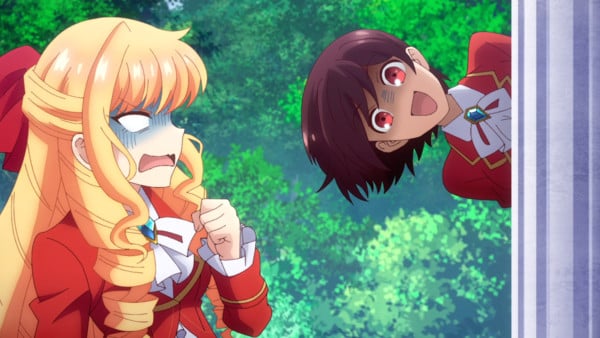
Primarily, I prefer my anime subtitled, but I'm not averse to watching a high-quality dub if given the opportunity. When Crunchyroll surprisingly streamed a day-one English dub of bonkers yuri isekai comedy-drama I'm in Love with the Villainess, my Apple TV defaulted to it, and then stayed there for the rest of the season. It's that good, and much of its success can be laid squarely at the feet of protagonist Rae Taylor's wonderfully talented English-language voice actor Hannah Alyea.
Although the “villainess isekai” subgenre has seen a massive boom in recent years, I'm in Love with the Villainess stands head and shoulders above most of its contemporaries. The fact that it's a yuri love story marks it unique enough. It's also a multilayered narrative that explores a variety of culturally relevant progressive themes, including sexual politics, queer identities, and systemic societal injustice and inequality. Set in a world sharply divided between rich, privileged nobles and an increasingly frustrated commoner underclass, Rae Otonashi is a former overworked Japanese businesswoman who finds herself transported to the body of Rae Taylor, the protagonist of the otome game “Revolution”.
Rei brings with her an unquenchable love for Revolution's villainess character Claire François, who isn't meant to be romanceable, unlike the three princes Rei desperately attempts to avoid. While Rei's a larger-than-life, cartoonishly obsessed (at least at the beginning of the show) character, she harbors depths of pain and self-sabotage that make her a fascinating lead. Alyea's energetic performance nails Rei's irrepressible disaster lesbian gremlin energy, elevating every scene with infectiously unhinged glee. I already adore the source light novels, but Alyea's incredible version of Rae makes the anime by far the most uproariously funny version of the story.
Lindsay Sheppard as Claire, the perpetually exasperated target of Rae's enthusiastically overwhelming love-bombing, similarly does a great job with her character, from haughty ojosama cackles to increasingly embarrassed protestations. The central duo's interactions are what carry the show, and they excel at the heartfelt romantic scenes almost as much as during their more light-hearted daft double act. My only criticism is that with merely twelve paltry episodes, there isn't enough of the anime! The adaptation stops partway through the second of five novel volumes. Later storylines go absolutely wild, and I'd trade in any number of other copycat villainess isekai stories to see them animated, and voiced by this English-language cast.
—Kevin Cormack
Mobile Suit Gundam GQuuuuuuX
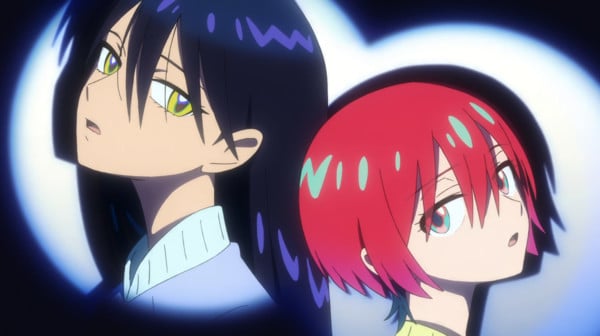
Back in Cowboy Bebop's heyday, the 90s, most English dubs would fall into one of three categories: not great, so bad it's good, and my personal favorite, the quirky yet spectacular. Classic dubs like Macross Plus, Tenchi Universe, and Galaxy Express 999 are a few titles I find myself regularly thinking back to. In that era, the actors behind the mic often came from a wide variety of disciplines, including voice-over, radio, and stage acting. This often resulted in dubs that sound a touch wonky on occasion, but this diversity of artistic disciplines also gave rise to some of anime's most memorable performances.
Over twenty years later, the situation is a little different. With the advent of simuldubbing, it became necessary for studios to cast voice-over artists who could easily slide into a role and work quickly to meet these tighter deadlines. Unfortunately, that doesn't always provide a ton of time for experimentation in the booth.
With all that in mind, I was utterly shocked when I flicked on the first episode of Mobile Suit Gundam GQuuuuuuX. Kazuya Tsurumaki's insane Gundam fanfic is one of the best English dubs I've heard lately, but more importantly, it transported me back to that bygone era of anime dubs. The crew at NYAV Post has done an utterly amazing job of assembling a cast comprised of new talent, modern anime stalwarts like Anairis Quiñones (Nyaan), and voice-over artists who've rarely worked in anime, such as Avatar: The Last Airbender's Jack DeSena (Jezzi).
On the topic of new talent, Thea Saccoliti crushes it as Machu. After listening to her performance in the first episode, you'd think that she's been at this for years. Nope, this is her first big role! Saccoliti masterfully sells Machu as a detached and emotional teenager who's looking for a real sea to swim in. That's no easy feat. I'd be remiss if I forgot to mention Fajer Kaisi's sultry performance as Challia Bull—the silver fox that's got everyone tugging at their collar.
Needless to say, this “Zeknova” of talent impresses me from top to bottom—not only ensuring that I'll be eagerly tuning into GQuuuuuuX's final episodes, but looking forward to what NYAV Post and this cast do next. And by the way, whenever you hear that NYAV Post is producing a dub, you should check it out. From The First Slam Dunk to Mars Express, they always knock it out of the park.
Baccano!
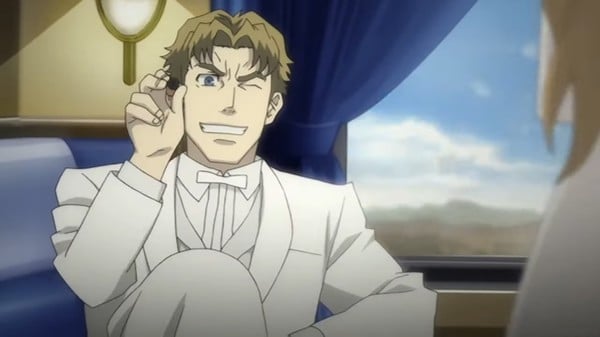
One point about anime dubs is that there's often a question of context. Series taking place in Japan or Japanese-derived settings are going to bring an immediate sense of suspended disbelief about characters speaking English throughout them. That's not to say they can't still work—I found myself having plenty of fun with the Lycoris Recoil dub, for instance. More fantastical settings naturally get more leeway, but just going global lets the presentation start to loosen up. For example, there's the Black Lagoon anime, which takes place in Southeast Asia and sees the characters "canonically" speaking English, with the excellent English dub getting very clever with languages in places. And then there's the case of Baccano!, an anime series that takes place almost entirely in the 1930s United States.
Baccano! in Japanese is no slouch. It's got Yū Kobayashi, Takehito Koyasu, and Norio Wakamoto among others filling out the massive ensemble cast. But it can't be overstated how right the series feels in English. It's not just a case of being accurate for the place. Rather, the time is highlighted effectively as well, with multiple characters sporting spirited New York accents, American bluster, and even heavy European accents where the story calls for it. It's a supernatural gangster flick, and the dub decidedly sounds the part.
Being a story that's naturally supposed to be told in English could only properly come through if the voice acting performances felt natural for the characters. Baccano! is a thoroughly wild ride a lot of the time, but even at their most cartoonish, the voices still feel "right" for the characters they're adapting. J. Michael Tatum and Caitlin Class sport pitch-perfect chemistry as the recurrent thief duo Isaac and Miria, to the point that it was massively disappointing they weren't brought back as the couple for their cameo in Durarara!!. The character of Claire Stanfield has some spoilery reasons that his register has multiple ranges, which Jerry Jewell covers with aplomb. The biggest standout might be Brayn Massey playing Ladd Russo, delivering his unhinged, gravely glee in what was surprisingly one of the actor's earliest dubbing performances. This applies to many of the characters, as the huge ensemble was assembled through auditions that specifically sought newcomers. The result is a one-of-a-kind all-timer of an English-dubbed anime, and for my dollars, the definitive way to experience Baccano!. Now, if only it could get a fresh release sometime soon.
—Christopher Farris
Panty and Stocking
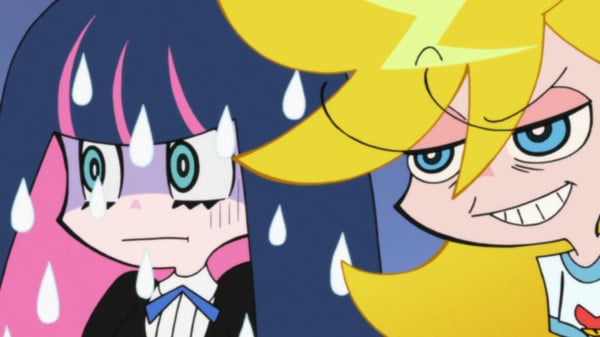
“Oh, Stocking, are you on a diet? You can tell me!” Jamie Marchi's taunts as Panty and Monica Rial's haughty, crazed laughter as Stocking replay in my mind at least twice a year. I have to force quit the clip in order not to drive myself and everyone around me crazy by constantly replaying: “Peekaboo. I saw it. There it is. Hello. Fatty. Fatty! FATTY!” Despite how much I like the dub series now, I was hesitant to listen to it in the first place. At the time of the Funimation DVDs, I expected the English toilet humor and constant inclusion of F-bombs to be juvenile and grinding. I'm glad my friends insisted on watching it together to prove my assumptions wrong. The 2010 anime, which follows the Anarchy sisters, primed itself to be perfect for an English dub. Combining the humor of American adult animation shamelessness and wacky visuals, Panty and Stocking promises a good use of your time.
In addition to an excellent cast, the strong English script and direction helped align the dialogue and tone, striking a balance between cheeky humor and cathartic cursing. Panty and Stocking's English dub further benefits by localizing and adapting jokes well suited for an American audience. I only wish Cherami Leigh (English voice of Kneesocks) kept to the same rolling r sound as the Japanese version when repeating the word “rules.”
As the series was conjured up from supposedly drunken circumstances, it never takes itself seriously. I was lucky enough to attend a panel with the voice actors, who were very comfortable slipping into character and bantering with each other. Even the outtakes, which should be a standard to include bloopers for all dubs, have me rolling on the floor in tears as the voice actors go from perfect delivery to incomprehensible swearing. Or when the line is so outlandish that they can't help but cry-laughing mid-sentence.
Although the English dub is arguably more straightforwardly vulgar than its Japanese counterpart, it never becomes crass, insensitive, or mean-spirited. Expletives and curses, when spaced out, help to deliver an appropriate build-up for the humorous punchlines. Originally released in 2012, the English dub has surprisingly held up well despite being thirteen years old. It handily clears even some recent non-anime adult animated titles, which, as a genre, have become too comfortably reliant on unmitigated, tasteless insults for cheap laughs.
—Kalai Chik
Tenchi Forever!: The Movie
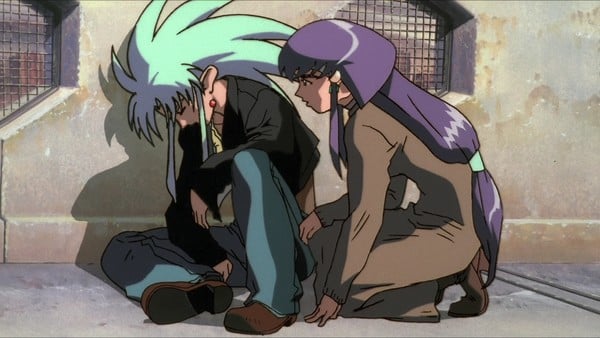
Tenchi's dub sounds either quaint or antiquated by today's standards, depending on how charitable you want to be. It was the first anime dub commissioned and published by the long-defunct Pioneer (later Geneon), and it exhibits most of the growing pains of '90s localization. The quality of the acting is spotty across the cast. There's too much emphasis on matching the tone and lip flaps of the original, at the expense of the natural cadence of English dialogue. And it's not exactly working with elevated source material. The reason people still celebrate Cowboy Bebop's dub is because dubs like Tenchi's were the norm at the time.
Why, then, am I claiming that Tenchi Forever! has as good a dub as Cowboy Bebop? In a word, I'd say it comes down to character. Across the franchise's many iterations in the '90s, Tenchi's dub oozes personality and charm of an ilk that we don't hear nowadays. I won't argue that anime localization isn't in a better place now than it was 20 or 30 years ago—that would be ridiculous—but I can't help but feel that we've lost something intangible as dubbing practices have been smoothed and cemented. Would Matthew K. Miller's Kermit-like timbre fly in a leading role nowadays? Would a modern ADR director tell Jennifer Darling to put on a posh English accent for Ayeka? Would they grab a stage actor with no prior anime roles like Petrea Burchard to portray an iconic and surly space pirate? For me, these choices and more came to be synonymous with Tenchi. Even the original Japanese seiyuu don't sound right to me. The English dub is the series, warts and all.
Moreover, Tenchi Forever! as a film represents the best of both the franchise and its localization. The movie is a slower and moodier experience than either the OVAs or their TV incarnations, and the dub actors rise to the occasion of the wider emotional register. The three leads in particular get to be vulnerable in a way that the series has never duplicated before or since. Miller's Tenchi is frustrated, confused, and compassionate. Darling's Ayeka puts her rivalry aside and bares her heart to Ryoko. And Petrea Burchard, whose feisty and gravelly delivery made me fall in love with Ryoko in the first place, delivers the apotheosis of her anime voiceover career. The overall dub still suffers from its usual rough edges, but when it matters, everyone comes together to make the dramatic and psychological beats land. Tenchi Forever! is also the swan song of Tenchi's Pioneer dub, recorded at the end of a six-year journey for the main crew and cast. That accumulated experience bears fruit here, and it's worth praising.
—Steve Jones
BECK: Mongolian Chop Squad

BECK: Mongolian Chop Squad didn't exactly pop off like a lot of the other shows on this list, but that's precisely why I wanted to talk about it today. I wanted to talk about a show that I thought had a fantastic dub that fully captures the spirit of what the show was trying to do, even if the very intentions of that show might have contributed to why it's not as widely popular or talked about compared to others. Beck is a story about adolescence. It's a slow-burning series about a young boy named Koyuki who is starting to discover a new love for music. It's nothing flashy, the color palette is incredibly muted, and all the designs are very simple. But everything about the show's presentation draws you with these incredibly chill vibes. It's not exactly a hyper energetic show, but I wouldn't call it melancholic either. A lot of shows like to glorify adolescence as this big, magical thing, but Beck shows us through music that adolescence can be very beautiful in its directionlessness.
We have a few Funimation mainstays here like Eric Vale and Justin Cook, but I think this was the show that sold me on Greg Ayres and Brina Palencia. There was a time when the former was in a lot of Texas shows as the main character, and I can see why. Greg Ayres has a very naturally young-sounding voice that makes him perfect for these adolescent roles that are normally given to women. In this show, Koyuki is very awkward and directionless, but not in an exaggeratedly cartoony kind of way. With almost every encounter he has, you could hear it in his voice, as if he is slowly trying to figure out what it is he wants to do with his life, especially after this rogue element of music suddenly got introduced into it. He makes mistakes, fumbles, and says the wrong thing, but that's because he genuinely doesn't know what the right answers to any of these bigger life questions are.
This contrasts beautifully with the singing, which I think is the thing that fully elevates the dub from good to amazing. Beck has a phenomenal soundtrack consisting of original songs and covers, most of which are in English as the series is very much a tribute to American Rock. In the Japanese version, we have the Japanese actors singing the songs in English, but here we have the dub actors giving their own take on the songs, and it sounds amazing. Greg Ayres is a really good singer, but his performance as Koyuki leans into the fact that this is a boy still figuring out just how important music will eventually be to him. His singing sounds as good as it does awkward, and I think it helps that this is where the performance becomes its most expressive. The world is very slow and confusing, but when Koyuki gets to sing either on stage or in private, literally everything lights up.
Then there's Brina Palencia, who plays Maho. This was the show that turned her into one of my favorite voice actresses of all time. Not only does she have an amazing range, but her musical contributions to Funimation as a whole really should be more appreciated. She's an incredibly talented singer. While we don't get to hear her ability to translate Japanese music since a lot of the music in this show is already in English, she sounds fantastic. This is a character who is much more comfortable and sure of herself as a contrast to Koyuki. She sings with this sense of joy and elation that is just addictive to listen to. But she can also slow things down with probably my favorite song in the whole show being Moon on the Water. There is nothing crazy that's happening when this song is sung, but it perfectly encapsulates the mood that the series is going for.
For a series that is about the slower and awkward stages of adolescence, Greg Ayres does a fantastic job of capturing that essence in such a natural way. He and Brianna Palencia's singing still hold up to this day, and while I can understand why the show didn't explode like many others, I still hold it in very high regard. I even still have the original DVDs that Funimation put out. If you don't have time to watch the show, please listen to the dub rendition of the songs. A lot of effort went into this show that I don't think it should be lost to time.
—MrAJCosplay
Aggretsuko
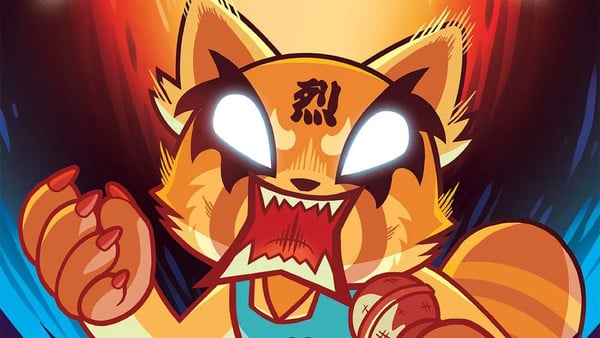
When Sanrio set out to design an icon for Millennial rage, they could hardly have done better than Aggretsuko, the story of a mild-mannered red panda Retsuko with a death metal-loving alter ego. Retsuko's daily vexations resound far beyond her Japanese office drone life; she's relatable to every adult who grew up on the childlike wonder of Hello Kitty and Cinnamoroll and is now frustrated and jaded from surviving three recessions and a pandemic. Perhaps it's the commonality of these feelings that contributed to Aggretsuko's impressive English dub. Whether you watch it in Japanese or English, the show's acting conveys a mood and tone of barely-suppressed fury that can be universally understood.
The biggest challenge—and subsequently, the biggest triumph—of this dub is Retsuko, a character so multifaceted that she requires two voice actors: one for her speaking voice, and one for her death metal scream. Erica Mendez delivers Retsuko's speaking voice in a way that feels sweet and youthful on the surface with a current of conviction underneath. With a performance that's both gentle and heroic in turns, it's no wonder Mendez was nominated for Best English VA Performance in the Crunchyroll Anime Awards for both 2019 and 2020. On the flipside there's Jamison Boaz's raw, edgy vocals whenever Retsuko lets off some death metal steam at karaoke. What makes Boaz's performance special is its clarity—even though he's growling and screaming, it's still easy to understand the lyrics. Retsuko's character feels balanced between these two very different performances. These switches between a high and low register for the same character's voice feel complementary enough that you don't hear the artificiality of a two-person performance, just the comedy of the sudden tonal shift.
The ensemble cast is equally talented. I have to make a particular shoutout to G.K. Bowes, who voiced both the ditzy deer Tsunoda and the go-getter gorilla Gori—exhibiting her impressive range. The late, great Billy Kametz excelled as Aggretsuko's neurotic colleague Anai; his performance grew with the character as Anai evolved from soft-spoken loner to confrontational antagonist. Benjamin Diskin walked a tightrope with his performance as Haida, managing to make this hyena who pines for Retsuko relatable when he could have come off as simply creepy. And of course, I'd be remiss not to mention Katelyn Gault's sarcastic, snide portrayal of Fenneko (she absolutely nailed the fennec fox's deadpan laugh). Aggretsuko is one of the only dubs I prefer to subtitles thanks to its witty localization and talented vocal cast. Its five bite-sized seasons are still worth a watch (and a listen) today.
—Lauren Orsini
The Boy and the Heron
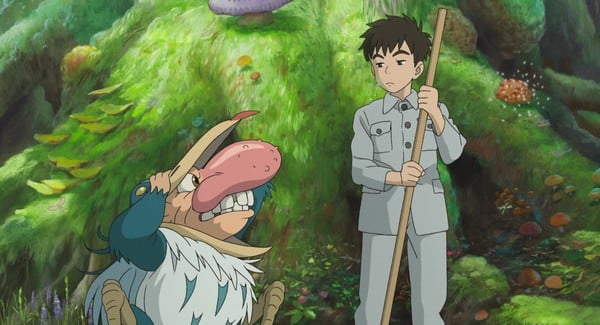
I confess I'm probably the exact demographic that defaults to thinking of Cowboy Bebop as “the best dub.” I watched a lot of dubs on Cartoon Network and on DVD in the 2000s, and then basically stopped keeping up with dubbed anime once subbed simulcasts became a greater convenience. But there are still circumstances where I actively seek out watching a dub. Circumstances such as when Robert Pattinson plays a weird little guy in a Ghibli movie.
When I first saw images of the gremlin dude living inside the skin of a grey heron in Hayao Miyazaki's The Boy and the Heron, I immediately thought he should be voiced by Danny DeVito. Turns out GKIDS president Dave Jesteadt thought the same thing , only to be told the Ghibli team wanted a younger, hotter actor in the role to match the Japanese casting of Masaki Suda. And so The Boy and the Heron dub would reveal to the world Edward Cullen's talent for doing the freakiest voices (talent he'd put to use for the Ren and Stimpy-inspired clones in Mickey17).
Beyond Pattinson as the obvious standout, Florence Pugh is doing impressive double-duty as both the older and younger versions of Kiriko. Relative unknown Luca Padovan carries Mahito's complicated journey, and Karen Fukuhara nails the emotional gut punch of Lady Himi's final words to her future son. Dave Bautista is an intimidating Parakeet King, while Mamoudou Athie, Tony Revolori, and Dan Stevens are hilarious as lesser parakeets. Willem Dafoe as a dying seabird is both good casting and a fun insider gag calling back to The Lighthouse, his previous project with Pattinson.
The only performance less than excellent is Christian Bale, who made some CHOICES for Mahito's dad's confusing accent. However, even that casting works for three reasons: 1) the nostalgia of Howl from Howl's Moving Castle returning for another Ghibli film (just like in the Japanese versions), 2) the amusement of having two Batmen in the cast, and 2) the dad sounding off works as a reminder that we're not actually supposed to find this weapons manufacturer marrying his dead wife's sister likable.
I grew up enjoying all the Disney dubs of Miyazaki's films. Even the less-than-faithful ones have their positive qualities — I still love Phil Hartman's Jiji in Kiki's Delivery Service, even if his version's nothing like Rei Sakuma's and the Disney's original dub script was way off from the original. The Boy and the Heron is the best Ghibli dub yet, and if it ends up being the studio's swan song, they went out on a high note.
—Reuben Baron
Delicious in Dungeon
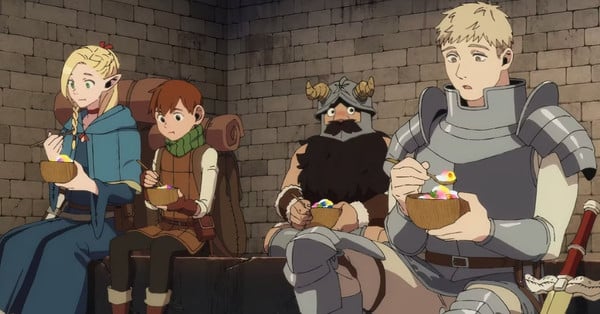
I'm sure I don't have to inform any readers about Delicious in Dungeon—both the original manga and the anime adaptation have both been extremely popular with fans almost since day one. And it's not hard to see why! It's a fresh and fun take on the fantasy genre, with a focus on food and cooking; and plenty of nods to popular dungeon-based games along the way. But something that really grabbed me when I first started watching the anime series was....wow, the English dub for this show is good. Really good! So much so that I feel the English dub is just as strong as the original. In fact, I may prefer it!
One of the main appeals of Delicious in Dungeon has always been it's colorful cast of characters, and the folks at Bang Zoom! did an incredible job gathering an equally excellent English cast for our Dungeon-crawling, monster-cooking crew. The slightly naive human, but lovable monster otaku Laios is given so much personality by Damien Haas. He does an excellent job capturing his easily excitable nature and his determined spirit. Marcille, the anxious and less experienced elf mage of the group, is given so much warmth and personality by newcomer to English dubs, Emily Rudd. There have been many instances over the years where TV and movie actors have tried to make the crossover into voice-over acting failed, because it's a completely different kind of beast when it comes to acting. But Rudd's performance really impressed me—she used her acting experience to give Marcille a unique voice that didn't just sound like another typically cute anime girl (or in this case, elf girl). She's especially good at comically yelling and angrily emoting, which is perfect for all the times when Marcille plays the role of the group's pickiest eater.
Casey Mongillo fits perfectly into the role of the halfling, Chilchuck. While Chilchuck looks young, in halfling years he's middle aged. Mongillo brings a slightly youthful, but deep-down tired to the bones feeling to his performance, which is such a relatable mood. The man of many voices, SunWon Cho, gives a “gruff guy with a heart of gold” sound to dwarf warrior Senshi, who consistently makes me laugh when he gets to do comedy bits in the show. Even actors for secondary characters we only see every so often are top-notch in this series—some of my favorites include Lisa Reimold's soft, yet strong Falin, Marin M. Miller's brash Namari, and Laura Stahl's aloof and catty Izutsumi.
Honestly, I could go on and on about what I love about this cast, but I think their hard work speaks for itself. If you haven't given Delicious in Dungeon's English dub a watch yet, I highly recommend it! (Now if only we could get a blu-ray release of it...)
—Dawn H
Death Note
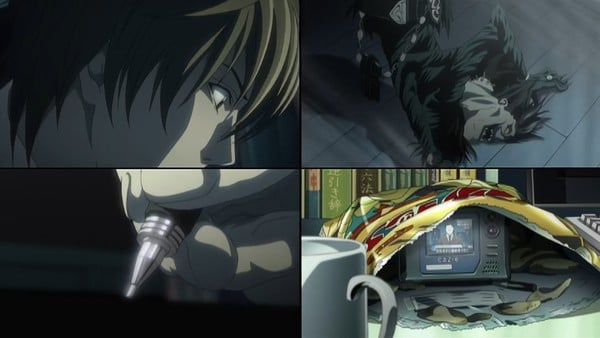
Imagine if the guy who voiced Super Weenie Hut Jr's taking on human form also voiced a guy whose actions singlehandedly could've launched a thousand true crime podcasts. Actually, you don't have to imagine, because that guy is the legendary Brad Swaile in the Death Note dub.
While, even at the time of this dub's initial release, Swaile had taken on plenty of other huge roles (EX: Ray Amuro in Gundam 0079, Lan in Mega Man NT Warrior), let's be honest: most people knew him first and foremost from the early 2000s hit Gundam Wing. There he voices Quatre Raberba Winner, a character who's about as happy and innocent as a Gundam pilot can possibly be. This might make Swaile's casting as Light seem hilarious, but consider this: part of Light's whole thing is that he seems innocent to everyone around him aside from L. So his casting as Light was perfect. Plus, it was Swaile who had the last evil laugh, because even when he's not trying to convince everyone that he's totally not a megalomaniacal mass murderer, he absolutely smashed it out of the park as Light.
Light spends so much time monologuing in this already dialogue-heavy anime that I can't help but point to Swalie's performance as a big part of what makes this dub so great. But brilliant as Swaile is for being able to perfectly capture the many contrasting moods of a character who often goes from being a popular straight-A student, to coolheaded strategist, to Saturday morning cartoon villain at the drop of a hat (or the exploding of a self-combusting desk made completely offscreen that's never brought up a second time), his is far from being the only excellent performance in this dub: Brian Drummond (Ryuk), Alessandro Juliani (L), Shannon Chan Kent (Misa), Chris Britton (Soichiro Yagami), Cathy Weseluck (Near), and Sam Vincent (Sidoh and Stephen Gevanni) also particularly stand out. Still, it's worth saying plainly that everyone does a great job in this dub—which is no small feat, considering how completely absurd many of the scenes are despite how seriously Death Note takes itself.
But even the best voice acting can only do so much without a decent script, so helping this rockstar cast shine its brightest is an equally great localization that goes full force in proving why “character voice” (not their literal voices, but say, their word choices) is so important. Every single character's dialogue and general style of speaking feels totally unique to them, which is especially important in a series with the sheer volume of dialogue that Death Note has.
—Kennedy
Samurai Champloo
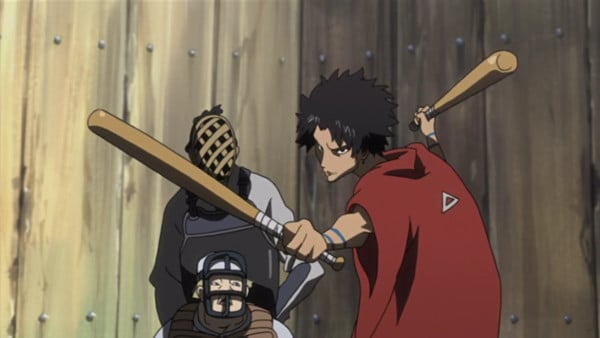
When you make one of the all-time best dubs to rock the airwaves, what do you do? Simple: you make another one. And you make it better too! If Cowboy Bebop's dub is perfect, then Samurai Champloo is transcendent. It takes things a step further by making something that is way more rollicking, frenetic, funny, and thrilling altogether.
First the obvious and most important: Steve Blum is Mugen before he is Spike Spiegel. Don't get me wrong, Blum is great as Spike. Spike seems modeled after Elliot Gould's interpretation of Philip Marlowe from the film The Long Goodbye, and Blum pulls this performance off with absolute gusto; like Gould, he's calm, sharp, caustic, and a little bit on-the-nose. With Mugen being a gangsta-fied samurai, Blum doesn't have much of a character to base his performance on, and he's forced to be more original in his performance. That's the key here. Blum as Mugen is so daring and out of control that he's unrecognizable. It's clear that Blum revels in Mugen's chaos, and you can hear every line delivery meld the right blend of menace and glee.
Kirk Thornton also works wonders at being Jin. His cool, calm, and collected attitude makes him the perfect foil to Mugen; an orderly Apollo to a hot-tempered Dionysus. Yet underneath Jin's demeanor lies someone just as violent, and Thornton understands that entirely. I'd argue that Thornton's low-tempo timbre is just as powerful and foreboding as Jin's violent methods. Speak softly and carry a big stick, indeed. (Or sword).
And as for Kari Wahlgren? Her vocal range here is uniquely Fuu. Wikipedia and the ANN encyclopedia remind me that she played Kagami in Lucky Star, and yet I always seem to forget this. It's a testament to Wahlgren's talent that she can use the same voice for two completely different characters and yet still maintain that element of difference. Wahlgren never plays Fuu as a damsel in distress either. She's dominating, forceful, sly, clever, always doing what she can to keep Mugen and Jin on a leash.
The way our main trio interact with each other and the other characters of the show makes for some very funny moments as well. Did their shit-talking pave the way for how The Boondocks was scripted and acted, especially since they were both on Adult Swim? Tin foil hat theory of mine, but I'd like to think so.
—Jeremy Tauber
discuss this in the forum (23 posts) |